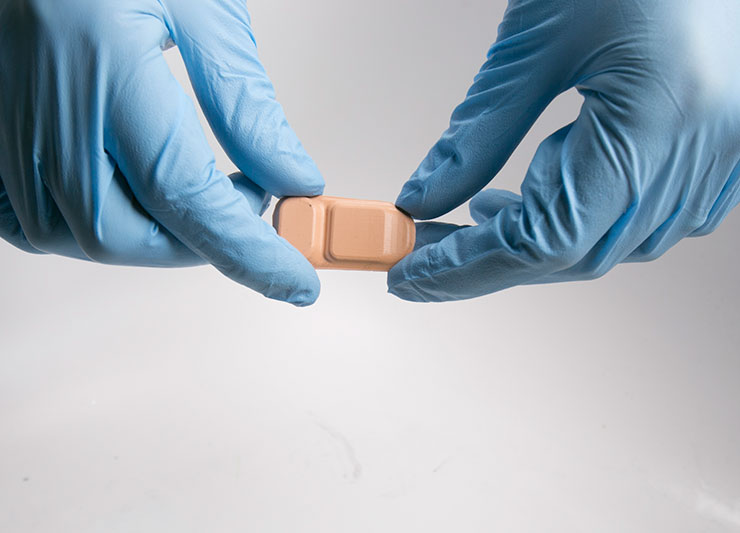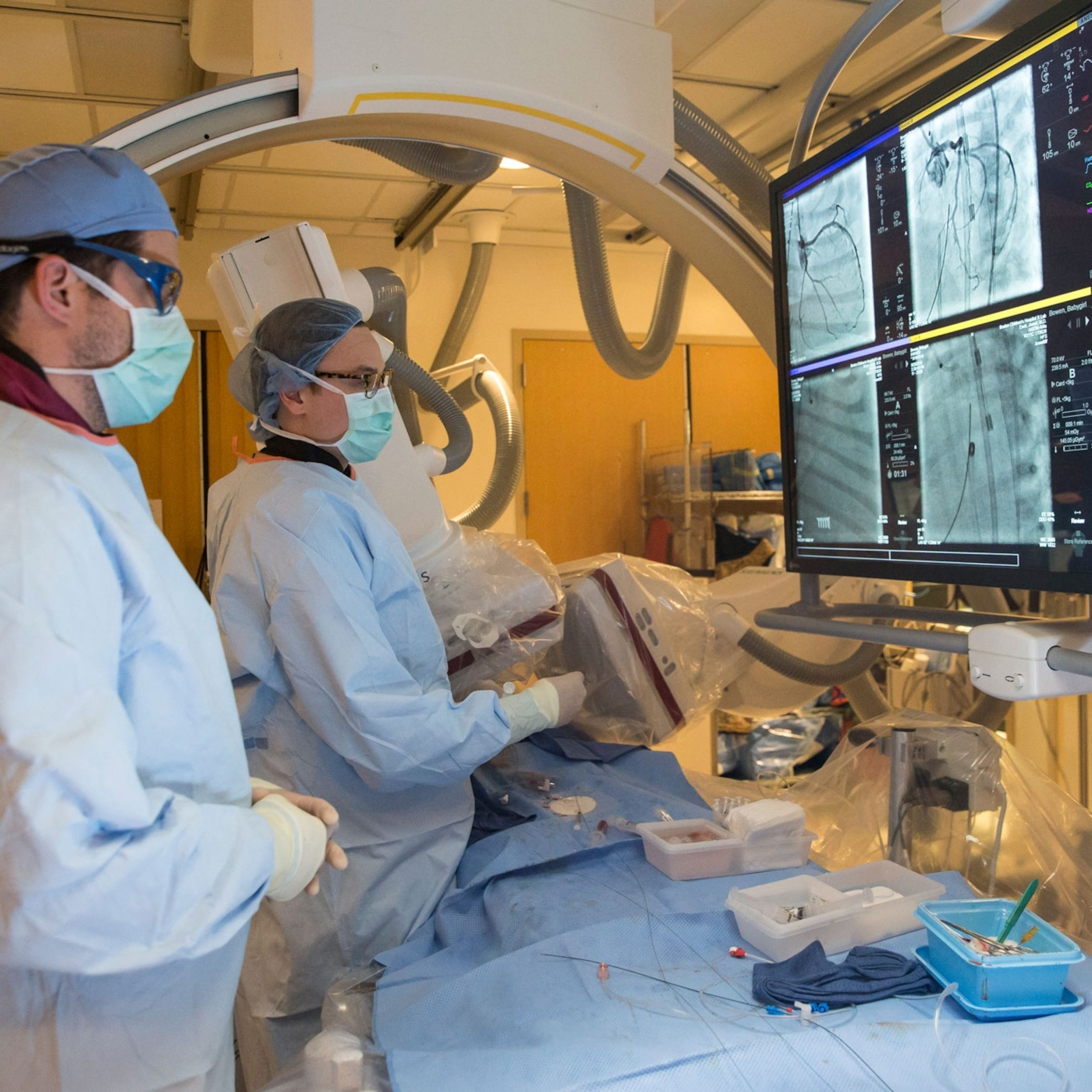Heart Block Treatment Without Surgery in Bangladesh 2023
Heart block can be treated without surgery using medications and lifestyle changes. These treatment options help manage the condition and improve heart function.
In some cases, a pacemaker may be necessary for severe heart block. However, surgery is not always required and non-invasive treatments are available. With the right medical care and adjustments to daily habits, individuals with heart block can lead active and fulfilling lives.

Credit: news.northwestern.edu
What Is Heart Block And Its Types?
Heart block is a condition where there is a disruption in the electrical signals that control the heartbeat. There are different types of heart block, and non-surgical treatments are available to manage the condition effectively.
Heart block is a condition that affects the electrical system of the heart, leading to abnormalities in the heart’s rhythm. It occurs when there is a delay or complete blockage in the conduction of electrical signals from the upper chambers (atria) to the lower chambers (ventricles) of the heart.
Understanding the different types of heart block and their respective treatments is crucial in managing this condition effectively.
First-Degree Heart Block: Causes, Symptoms, And Diagnosis
- In first-degree heart block, there is a delay in the conduction of electrical signals, but all the signals eventually reach the ventricles.
- Causes:
- Certain medications, such as beta-blockers or calcium channel blockers.
- Age-related degeneration of the electrical conduction system.
- Underlying heart conditions, such as myocardial infarction.
- Symptoms:
- Most often, first-degree heart block doesn’t cause noticeable symptoms.
- In some cases, fatigue, dizziness, or fainting may occur.
- Diagnosis:
- An electrocardiogram (ecg) is used to diagnose first-degree heart block.
- Other tests, such as a stress test or holter monitor, may be recommended to evaluate the heart’s overall functioning.
Second-Degree Heart Block: Description, Stages, And Treatment
- Second-degree heart block is characterized by intermittent or occasional blockage of the electrical signals from the atria to the ventricles.
- Description:
- There are two subtypes: Type 1 (wenckebach) and type 2.
- Type 1 is characterized by the progressive lengthening of the conduction time until a signal is blocked.
- Type 2 is characterized by sudden and intermittent blockage of the signals without a progressive lengthening.
- Stages:
- Type 1 second-degree heart block often progresses to more advanced heart blocks.
- Type 2 second-degree heart block is more serious and usually requires medical intervention.
- Treatment:
- In some cases, monitoring the condition may be sufficient if there are minimal symptoms or the heart block is stable.
- Medications like atropine or pacemakers may be necessary to stabilize the heart’s rhythm and prevent complications.
Third-Degree Heart Block: Life-Threatening Conditions And Emergency Steps
- Third-degree heart block, also known as complete heart block, indicates no conduction of electrical signals from the atria to the ventricles.
- Life-threatening conditions:
- Without immediate intervention, third-degree heart block can lead to a significant decrease in heart rate and cardiac output, which can be life-threatening.
- The heart’s electrical signals may originate from the ventricles instead of the natural pacemaker, resulting in a slower heart rate.
- Emergency steps:
- A temporary pacemaker is often necessary to stabilize the heart’s rhythm.
- In severe cases, a permanent pacemaker may be implanted to regulate the electrical signals and ensure proper heart function.
Remember, identifying the type of heart block is crucial for determining the appropriate treatment strategy. Regular monitoring and timely intervention can significantly improve the quality of life for individuals with heart block.
Non-Invasive Treatment Methods For Heart Block
Heart block can be treated non-invasively, without the need for surgery. These methods focus on improving heart function and managing symptoms through medications, lifestyle changes, and specialized devices.
Living with heart block can be challenging, but there are non-invasive treatment methods available that can help manage this condition without the need for surgery. In this section, we will explore three different approaches that can be used to effectively treat heart block: medication options, lifestyle changes, and holistic approaches.
By understanding these treatment methods, individuals with heart block can take control of their health and improve their quality of life.
Medication Options For Heart Block Control:
- Beta blockers: These medications work by blocking the effects of adrenaline, slowing the heart rate, and reducing the workload on the heart.
- Calcium channel blockers: They relax and widen the blood vessels, improving blood flow and reducing the strain on the heart.
- Digitalis medications: These drugs help strengthen the heart’s contractions and regulate the heart’s rhythm.
- Antiarrhythmic medications: They help control abnormal heart rhythms, restoring a normal heart rate and rhythm.
Lifestyle Changes That Promote Heart Health:
- Regular exercise: Engaging in moderate-intensity activities like walking, swimming, or cycling can help improve heart function and overall cardiovascular health.
- Healthy diet: Opting for a balanced diet that includes plenty of fruits, vegetables, whole grains, lean proteins, and low-fat dairy can support heart health.
- Managing stress: Finding effective stress management techniques, such as meditation, deep breathing exercises, or engaging in hobbies, can help reduce the impact of stress on the heart.
- Quitting smoking: Smoking damages blood vessels and contributes to the development of heart disease. Quitting smoking can significantly improve heart health.
- Limiting alcohol consumption: Excessive alcohol intake can damage the heart muscle and contribute to heart rhythm abnormalities. Moderation is key.
- Maintaining a healthy weight: Losing excess weight can reduce the strain on the heart and improve overall heart health.
Holistic Approaches For Managing Heart Block:
- Acupuncture: This ancient practice involves the insertion of thin needles into specific points on the body to promote healing and balance. It can help alleviate symptoms related to heart block.
- Yoga and meditation: These mind-body practices can help reduce stress, lower blood pressure, and improve heart health.
- Herbal supplements: Certain herbal supplements, such as hawthorn, may help improve heart function and regulate heart rhythms. However, it is essential to consult with a healthcare professional before taking any supplements.
- Chiropractic care: Spinal adjustments can enhance the communication between the nervous system and the heart, potentially improving heart function.
It is important to note that while these non-invasive treatment methods can effectively manage heart block, they should always be pursued under the guidance and supervision of a healthcare professional. Each individual’s condition is unique, and an individualized approach is necessary for optimal outcomes.
By incorporating medication, making lifestyle changes, and considering holistic approaches, individuals with heart block can take control of their treatment and improve their heart health.
Revolutionary Techniques For Heart Block Treatment
Explore revolutionary techniques for heart block treatment without surgery in Bangladesh. Discover safe and effective alternatives that can help improve heart health and avoid invasive procedures. Experience the benefits of non-surgical interventions for heart block and enhance your overall well-being.
The field of cardiology has witnessed groundbreaking advances in the treatment of heart block, offering new hope to patients without resorting to invasive surgeries. Through innovative techniques such as cardiac resynchronization therapy (crt), bioelectromagnetic therapy, and neuromodulation, healthcare professionals are now able to regulate heart rhythms and improve overall heart function.
Let’s explore these revolutionary approaches in more detail below.
Cardiac Resynchronization Therapy (Crt) – A Breakthrough Discovery
- Crt utilizes specially designed pacemakers to enhance heart function and restore proper synchronization between the heart’s chambers.
- These devices work by delivering precise electrical signals to both ventricles, allowing them to contract together and optimize blood flow.
- By improving coordination and efficiency of the heart’s pumping action, crt can alleviate symptoms associated with heart block, such as fatigue and shortness of breath.
Bioelectromagnetic Therapy – Harnessing The Power Of Electricity
- Bioelectromagnetic therapy employs low-frequency electrical currents to regulate the heart’s electrical impulses and promote regular heartbeats.
- This non-invasive technique involves the placement of electrodes on the chest, which deliver targeted electrical stimulation to specific areas of the heart.
- The electrical signals help synchronize the heart’s contractions and improve its overall rhythm, providing relief from heart block symptoms.
Neuromodulation – Pioneering The Regulation Of Heart Rhythm
- Neuromodulation harnesses advanced technology to regulate the heart’s rhythm by targeting specific nerves that influence heart function.
- This procedure involves the implantation of a small device, typically near the collarbone, which delivers calibrated electrical impulses to the targeted nerves.
- By modulating the nerve activity, neuromodulation can effectively regulate heart rate and rhythm, ensuring proper blood flow and reducing the impact of heart block.
The advent of revolutionary techniques like cardiac resynchronization therapy, bioelectromagnetic therapy, and neuromodulation has transformed the landscape of heart block treatment. These cutting-edge approaches offer patients the possibility of improved heart function and symptom relief without the need for invasive surgeries.
With ongoing advancements in the field of cardiology, the future looks promising for individuals living with heart block, providing them with new avenues for a healthier and more fulfilling life.
Advancements In Heart Block Monitoring Systems
Heart block monitoring systems have seen significant advancements, offering non-surgical treatment options for heart block. These innovative systems provide effective and precise monitoring, ensuring patient safety and optimal care.
Heart block is a serious condition that requires careful monitoring and treatment. Fortunately, advancements in technology have revolutionized the way doctors can monitor heart block without resorting to invasive surgery. Let’s explore three cutting-edge advancements in heart block monitoring systems: the implantable loop recorder (ilr), mobile app-based ecgs, and wearable devices.
Implantable Loop Recorder (Ilr) – The Future Of Heart Monitoring:
- The implantable loop recorder (ilr) is a small device that is implanted under the skin to continuously monitor the electrical activity of the heart.
- This advanced system can record and store information about the heart’s rhythm for up to three years, allowing doctors to accurately diagnose and monitor heart block episodes.
- By providing real-time data, ilrs offer a comprehensive view of the heart’s activity, enabling physicians to make informed decisions about treatment options.
- The device is easily implanted during a simple outpatient procedure, minimizing discomfort and recovery time for patients.
Mobile App-Based Ecgs – Empowering Patients With Convenience:
- Mobile app-based ecgs allow patients to monitor their heart rhythm conveniently from the comfort of their homes.
- Through the use of portable ecg devices and compatible smartphone apps, patients can record their heart’s electrical activity and share the data directly with their healthcare provider.
- These app-based systems are user-friendly and require minimal technical skills, empowering patients to actively participate in their heart health management.
- With immediate access to accurate ecg readings, patients can quickly identify any irregularities and seek timely medical attention, reducing the risk of complications.
Wearable Devices – Transforming Heart Health Monitoring:
- Wearable devices, such as smartwatches and fitness trackers, offer continuous heart rate monitoring and alert users to any irregularities.
- These devices use sophisticated sensors and algorithms to detect abnormal heart rhythms, including heart block, and provide timely notifications to the wearer.
- By integrating heart monitoring into everyday devices, wearable technology promotes early detection and proactive management of heart block.
- Wearable devices also enable users to track their activity levels, sleep patterns, and overall health, giving a holistic view of their well-being.
Advancements in heart block monitoring systems bring new possibilities for accurately diagnosing and effectively managing this cardiac condition. The implantable loop recorder (ilr), mobile app-based ecgs, and wearable devices offer convenient and non-invasive ways to monitor heart block, giving patients and healthcare providers valuable insights for timely intervention and improved outcomes.
With these cutting-edge technologies, the future of heart monitoring is becoming more accessible and patient-centric.
Combining Medical Interventions With Lifestyle Modifications
Combining medical interventions with lifestyle modifications provides effective heart block treatment without surgery by addressing the issue from multiple angles. This approach focuses on improving cardiovascular health through medications, dietary changes, exercise, and stress management to promote optimal functioning of the heart.
Living with heart block can be challenging, but with a combination of medical interventions and lifestyle modifications, you can effectively manage the condition without the need for surgery. In this section, we will explore three key areas that play a crucial role in your journey towards a strong and healthy heart: diet and nutrition, exercise and physical activity, and stress management techniques.
Diet And Nutrition: Keys To A Strong And Healthy Heart
Maintaining a well-balanced diet is vital for maintaining a strong and healthy heart. Here are some key points to consider when it comes to your diet and nutrition:
- Incorporate heart-healthy foods into your meals: Opt for foods that are rich in omega-3 fatty acids, such as fatty fish (salmon, mackerel), flaxseeds, and walnuts. These can help reduce the risk of cardiovascular problems.
- Focus on high-fiber foods: Include plenty of fruits, vegetables, whole grains, legumes, and nuts in your diet. These foods are not only good for your heart but also help regulate cholesterol levels and promote overall well-being.
- Limit sodium intake: Excessive sodium consumption can contribute to high blood pressure. Be mindful of processed and packaged foods, as they often contain high amounts of sodium. Instead, opt for fresh, homemade meals prepared with minimal salt.
- Stay hydrated: Adequate hydration is essential for a healthy heart. Aim to drink plenty of water throughout the day and limit sugary beverages.
Exercise And Physical Activity: Strengthening The Cardiac Muscles
Regular exercise and physical activity play a crucial role in strengthening your cardiac muscles and promoting heart health. Consider the following points:
- Engage in aerobic activities: Activities such as brisk walking, cycling, swimming, or dancing are great for increasing your heart rate and improving cardiovascular fitness. Aim for at least 150 minutes of moderate-intensity aerobic exercise per week.
- Incorporate strength training: Include strength training exercises at least twice a week to build muscle and support your overall fitness. This can involve using resistance bands, free weights, or even your body weight.
- Practice good posture: Maintaining proper posture throughout the day can help reduce the strain on your heart. Focus on sitting and standing up straight, engaging your core muscles, and avoiding slouching.
- Consult with your healthcare provider: Before starting any exercise program, it’s crucial to consult with your healthcare provider to ensure it aligns with your specific health needs and limitations.
Stress Management Techniques: Promoting Overall Well-Being
Chronic stress can significantly impact your heart health. Adopting stress management techniques can help promote overall well-being and reduce the risk of heart problems. Consider the following strategies:
- Practice relaxation techniques: Engage in activities such as deep breathing exercises, yoga, or meditation to help reduce stress levels and promote calmness.
- Prioritize self-care: Make time for activities that bring you joy and relaxation, such as engaging in hobbies, spending time with loved ones, or enjoying a warm bath.
- Get sufficient sleep: Aim for 7-9 hours of quality sleep each night. A good night’s rest is essential for rejuvenating your body and reducing stress levels.
- Seek support: Reach out to friends, family, or support groups to discuss your feelings and experiences. Sharing your concerns can provide emotional support and help alleviate stress.
Remember, while lifestyle modifications can aid in the management of heart block, it’s essential to discuss these strategies with your healthcare provider to ensure they align with your specific situation. By combining medical interventions with these lifestyle changes, you can take proactive steps towards a stronger and healthier heart.
Promising Research On Future Heart Block Treatments
Promising research is being conducted on future heart block treatments, focusing on non-surgical options. These innovative methods offer hope for patients seeking effective treatment without undergoing surgery.
Heart block treatment without surgery in Bangladesh: promising research on future heart block treatments
The field of cardiology is constantly evolving with groundbreaking research and technological advancements. As scientists and medical professionals continue to explore new possibilities in the treatment of heart block, several promising approaches have emerged. This article delves into three areas of research that hold significant potential for the future of heart block treatment: stem cell therapy, gene therapy, and the use of artificial intelligence in cardiology.
Stem Cell Therapy – Exploring The Potential Of Regenerative Medicine
Stem cell therapy has garnered considerable attention in recent years due to its regenerative capabilities. This innovative treatment approach involves using the patient’s own stem cells or donor cells to repair damaged tissues and stimulate the growth of healthy cells within the heart.
Here are some key points to consider:
- Stem cell therapy shows promise in improving heart function and reversing heart block by regenerating damaged conduction pathways in the heart.
- The use of mesenchymal stem cells derived from bone marrow or adipose tissue has demonstrated positive outcomes in pre-clinical and early clinical studies.
- Ongoing research aims to optimize stem cell delivery methods and identify the most effective cell types for heart regeneration.
Gene Therapy – Unlocking New Possibilities In Heart Block Treatment
Gene therapy, a cutting-edge approach in the field of medicine, holds significant potential for the treatment of heart block. This technique involves modifying the patient’s genetic code to correct or compensate for abnormalities in the heart’s electrical conduction system. Consider the following:
- Gene therapy for heart block aims to introduce functional genes into the heart cells, promoting proper electrical signaling and preventing heart block.
- Viral vectors or nanoparticles are often used to deliver therapeutic genes into the heart cells.
- Preclinical studies have shown promising results in animal models, demonstrating the potential of gene therapy as a viable treatment option for heart block.
Artificial Intelligence In Cardiology – Innovations For Enhanced Diagnosis And Treatment
Artificial intelligence (ai) is revolutionizing the field of cardiology by providing innovative solutions for diagnosis and treatment. With the ability to analyze complex data patterns and predict outcomes, ai holds great promise in managing heart block. Consider the following advancements:
- Machine learning algorithms can analyze electrocardiogram (ecg) data, helping clinicians identify early signs of heart block and predict its progression.
- Ai-powered imaging techniques can accurately detect blockages and abnormalities in the heart’s electrical system, facilitating personalized treatment plans.
- Decision support systems powered by ai can assist doctors in making informed treatment decisions, leading to more precise and effective interventions.
The future of heart block treatment looks promising, thanks to ongoing research and advancements in stem cell therapy, gene therapy, and the application of artificial intelligence in cardiology. These emerging approaches have the potential to revolutionize the way we diagnose and treat heart block, offering hope for improved patient outcomes and a brighter future for individuals living with this condition.
Frequently Asked Questions Of Heart Block Treatment Without Surgery in Bangladesh
What Are The Alternative Treatments For Heart Block?
Alternative treatments for heart block include medication to regulate heart rate and rhythm, lifestyle changes like exercise and a healthy diet, and implantable devices such as pacemakers to help maintain a normal heart rate. In some cases, surgery may be necessary to correct the blockage.
Is It Possible To Treat Heart Block Without Surgery in Bangladesh?
Yes, it is possible to treat heart block without surgery. Medications are often used to regulate the heart rate and rhythm, helping to manage the condition. Additionally, lifestyle changes such as maintaining a healthy weight, exercising regularly, and avoiding smoking can also help improve heart function.
In more severe cases, medical devices like pacemakers may be used.
How Effective Is Medication For Heart Block Treatment?
Medication can be quite effective for heart block treatment. Certain medications, like beta-blockers or calcium channel blockers, can help regulate heart rate and rhythm, improving heart function. However, the effectiveness of medication can vary depending on the severity of the blockage and the individual patient’s response to the treatment.
It is important to work closely with a healthcare professional to determine the most appropriate medication and dosage.
Conclusion
Treating heart block without surgery offers hope and relief for individuals suffering from this condition. By leveraging non-invasive techniques such as medication, lifestyle modifications, and advanced medical technologies, patients can manage their symptoms and improve their quality of life. Medications like beta blockers and calcium channel blockers help regulate heart rhythm, while lifestyle changes like regular exercise and a balanced diet contribute to overall cardiovascular health.
Newer advancements, such as implantable pacemakers and cardiac resynchronization therapy, offer targeted solutions for specific cases of heart block. These options enhance heart function and alleviate symptoms, laying a foundation for a healthier future. It is crucial for individuals diagnosed with heart block to consult with their healthcare provider to understand the most suitable treatment approach for their unique situation.
With the right care, it is possible to manage heart block and foster a fulfilling life, free from the burden of invasive surgery.

Dr. Helal, uniting science and nature for holistic health. Pioneering natural medicine for balanced living.








